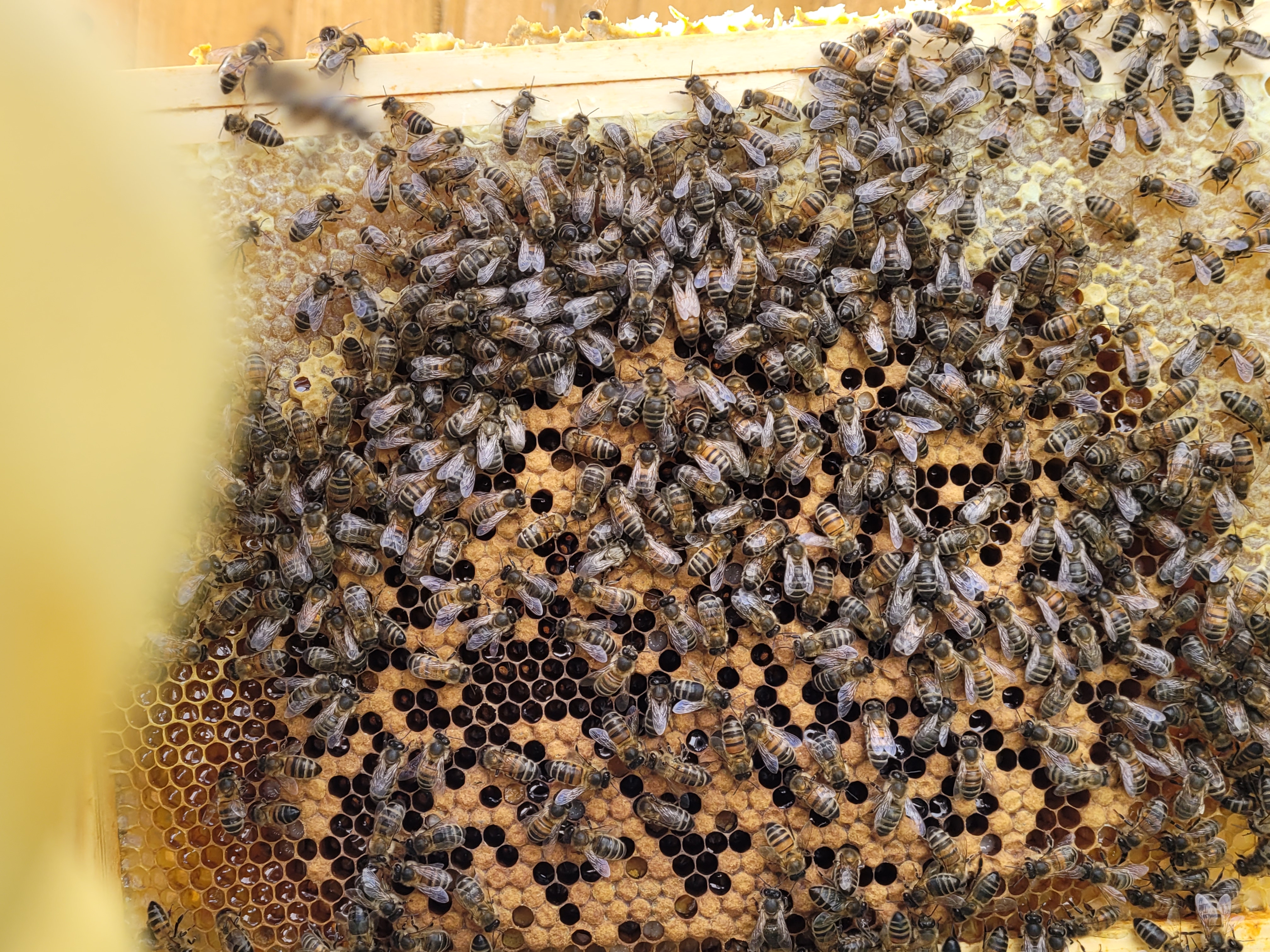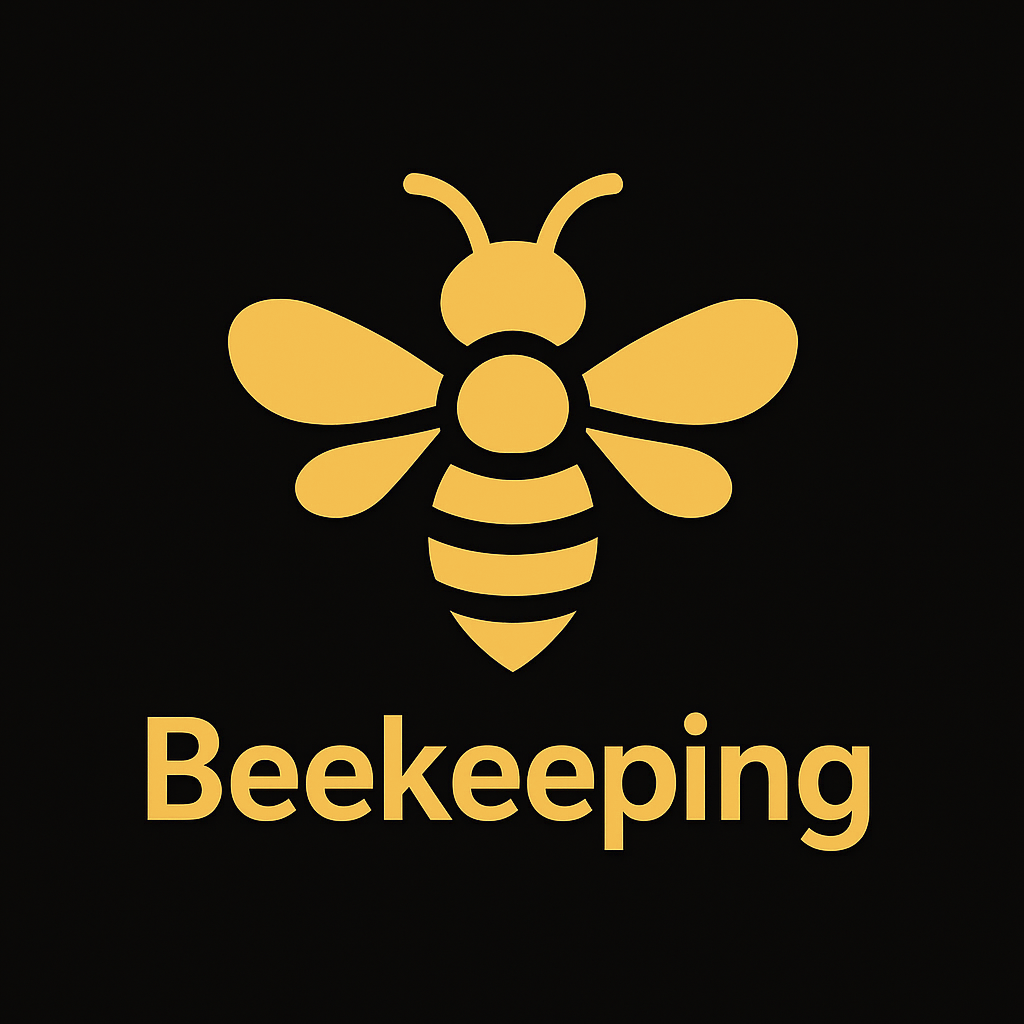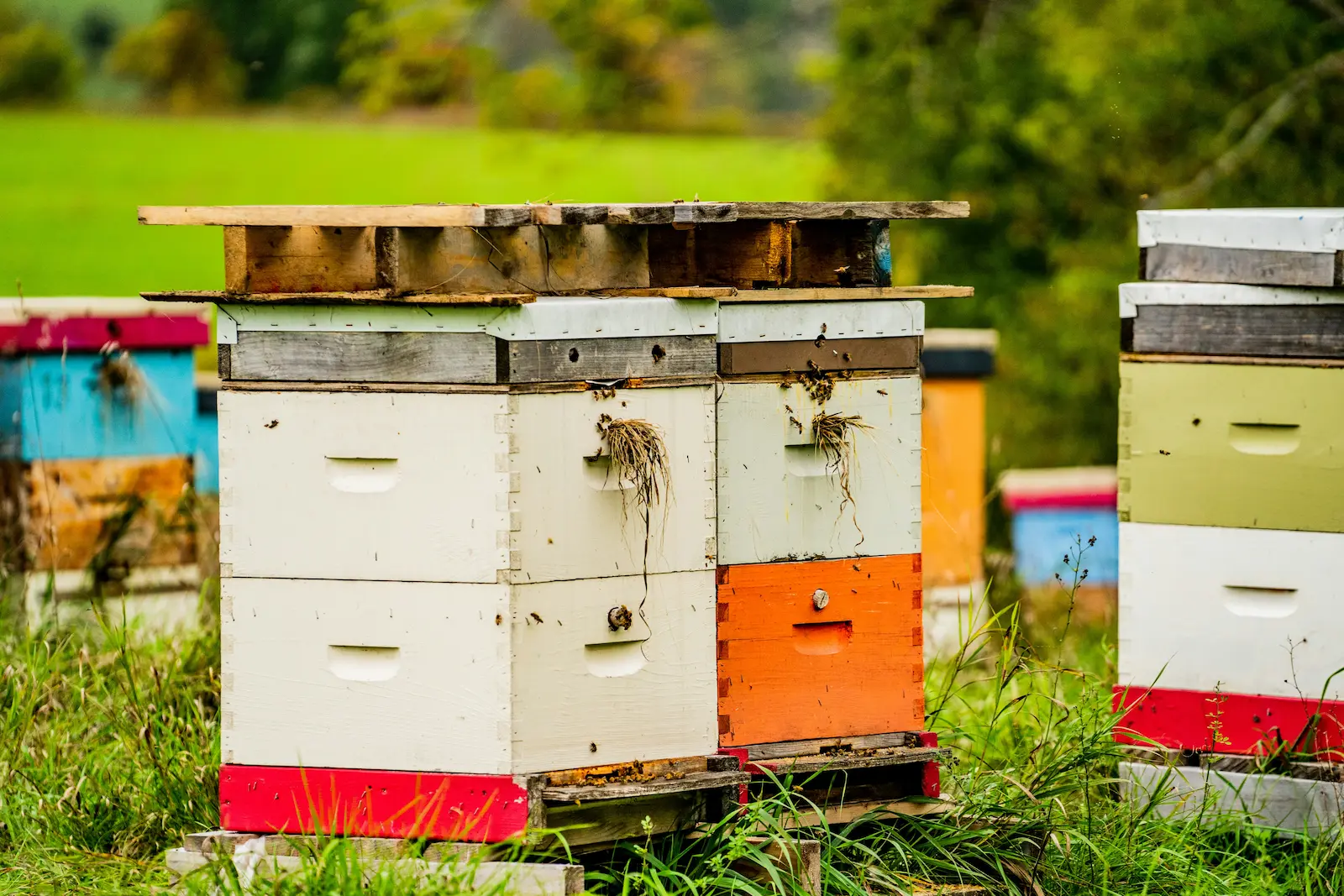A Year in the Apiary - March Beekeeping Tasks (UK)
March feels like the true start of the beekeeping season in much of the UK. The days are noticeably longer, bees fly more often and the brood nest usually begins to expand. At the same time, the weather can still swing between warm sunshine and cold snaps, so careful judgement is needed when planning your first full inspections.
This page is part of the BeezKnees Year in the Apiary – monthly beekeeping calendar. It focuses on March beekeeping tasks in the UK: when to carry out first spring inspections, how to assess brood and food, when to add supers and how to prepare your apiary for a season of growth.
March at a Glance – Key Spring Priorities
Bee Behaviour
- Brood nest expanding as queen increases laying
- More frequent foraging on mild, dry days
- Cluster loosens but still needs warmth at night
Key Jobs for the Beekeeper
- Plan and carry out first full inspections when weather allows
- Check brood pattern, queen performance and food stores
- Clean and prepare equipment, stands and supers
Risks to Watch
- Starvation if stores run out during a cold snap
- Chilling brood with overly long inspections
- Overcrowding if colonies grow quickly without space
What Your Bees Are Doing in March

In March, many colonies shift from winter survival mode into growth. The queen often lays more eggs, and bees work to keep a larger brood area at the right temperature. On suitable days you will see more consistent foraging for pollen and nectar as spring flowers begin to open.
Weather still matters. A sunny afternoon can tempt bees into heavy flight, only for a cold, wet spell to delay forage again. This stop-start pattern is why keeping a close eye on food stores remains so important. The hive management guide explains how temperature and brood rearing affect inspections in more detail.
Checking Food Stores – Avoiding Starvation in March
March is still a critical month for food. As brood rearing increases, colonies can suddenly run short, especially if earlier reserves were marginal or the weather turns poor after a brief warm spell.
- Continue to heft each hive regularly to monitor overall weight, just as you did in January and February.
- During your first full inspection, confirm that there are still frames of sealed stores close to the brood nest.
- If a hive feels very light or has only thin arcs of honey around brood, consider feeding – fondant in colder spells or syrup later when weather is reliably warmer.
Starvation often happens late in winter or early spring, not in the depths of January. Regular checks and timely feeding can prevent a colony from failing just as it is ready to expand. You can find broader feeding strategies in the hive management guide.
First Spring Hive Inspection – When and How
Your first full inspection of the year is one of the most important visits you will make. In much of the UK, this first inspection takes place in March or early April, depending on the weather and your location.
- Calm, dry and as warm as possible – ideally around 12°C or above.
- Bees should be flying steadily, not clustered tightly at the entrance.
- Avoid days with a cold, gusty wind or threat of sudden showers if you can.
During this inspection, your priorities are to:
- Confirm the colony is queenright – look for eggs, young larvae and a reasonably solid brood pattern.
- Check that there is still food close to the brood and space for the queen to continue laying.
- Look out for obvious signs of disease or pests in the brood and on adult bees.
- Remove any heavily soiled or clearly unused combs that you plan to replace as part of your comb management.
Work briskly but calmly, keeping the brood exposed for as little time as possible. The hygiene guide includes good practice for cleaning tools and managing comb changes during inspections.
Brood Assessment and Disease Awareness
March inspections give you a first clear look at how well the colony has come through winter. A healthy brood nest typically shows a compact, fairly even pattern with eggs, larvae and sealed brood in a logical sequence.
- Solid areas of brood with few random empty cells (allowing for natural variation).
- Cappings that are slightly domed and consistent in colour, without obvious sunken or greasy patches.
- No unusual or ropy contents when suspect cells are tested using approved methods.
If you see irregular patterns, sunken or perforated cappings, discoloured brood or smell anything unusual, take it seriously. Refer to the bee diseases overview and the detailed pages on bacterial diseases and viral diseases, and be prepared to contact your local bee inspector if foulbrood is suspected.
Adding Supers and Providing Space
As brood and bee numbers increase, colonies will need more space – for nectar, honey and to prevent congestion around the brood nest. In some parts of the UK, beekeepers add supers in March when early nectar flows, such as dandelions or oilseed rape, are starting.
- Add a super when the brood box is well occupied and bees are working most frames.
- Place drawn comb above if you have it; otherwise, foundation can be used but may be drawn more slowly in cooler weather.
- Keep records of when supers were added to help plan future inspections and any swarm control measures.
Thinking ahead now makes it easier to manage growth and swarm risk later in spring. For more, see the relevant sections in the hive management guide.
Apiary and Equipment Maintenance
March is a good time to tidy the apiary and make sure everything is ready for a busy season. Small jobs now can save you time and stress in April and May.
- Remove mouseguards once you are confident mice are no longer a risk.
- Scrape floors and clear debris from dead bees and winter detritus.
- Clean, scorch or wash spare equipment following good hygiene practice.
- Repair or replace damaged frames, roofs, boxes or stands.
- Confirm water sources are available and safe for bees to access.
More detailed tips on caring for tools, boxes and frames can be found in the equipment guide.
Planning the Season – Records, HiveTag and Learning
March is also a planning month. The information you gather from early inspections and your winter notes will guide your decisions on splits, queen replacement and equipment needs.
- Winter weight and feeding history for each colony.
- Varroa treatments used and any colonies that struggled.
- Notes on queen temperament, brood pattern and previous season honey production.
- Plans for potential splits, queen rearing or moving hives later in the season.
Digital record tools such as the HiveTag web app can make it easier to log inspections, feeding, treatments and hive locations, allowing you to compare colonies and spot trends over time.
March also remains a good time to build your knowledge. Many associations still offer talks, study groups and online sessions:
- Attend local association meetings or webinars on spring management, disease recognition and swarm control.
- Refresh key concepts using guides such as Getting Started and Honeybee Behaviour.
Forage and Helping Pollinators in March
As spring develops, more forage becomes available: willow, blackthorn, dandelions and early garden flowers all contribute pollen and nectar. Supporting this early forage benefits both your bees and other pollinators.
- Avoid heavy mowing of areas with early flowers like dandelions when practical.
- Continue planting and planning pollinator-friendly borders and containers.
- Reduce or avoid pesticide use, especially during flowering periods.
For more ideas on making your garden or local space bee friendly, visit the bee gardening guide and Help the Bees section.
March Beekeeping FAQ – UK Beekeepers
When should I do my first full hive inspection?
Choose a calm, dry day with temperatures around 12°C or higher and bees flying freely. In some areas this may happen in late March, in others it may be early April. Avoid rushing an inspection on a cold, blustery day just to keep to a calendar date.
How do I know if my bees still have enough food in March?
Continue to heft the hive from the back or side and compare the weight with previous visits. A hive that suddenly feels light compared with others may need feeding. During your first inspection, check that there are frames of sealed stores near the brood nest and add fondant or syrup if necessary.
What should I look for in the brood nest?
Look for a good pattern of eggs, larvae and sealed brood, with few random empty cells. Check for any obvious signs of disease, such as sunken cappings or a bad smell, and make sure the queen has space to continue laying.
Do I remove mouseguards in March?
Many beekeepers remove mouseguards in March once they are confident that mice are no longer a significant risk and bees are flying freely. Removing them reduces congestion at the entrance and helps bees bring in pollen and nectar efficiently.
Is it safe to add a super in March?
In some regions and in strong colonies, yes. When bees occupy most frames in the brood box and early nectar flows are underway, adding a super provides space and can help reduce congestion. Always consider local forage, weather and colony strength before adding too much space.
Should I be worried about varroa in March?
Yes, varroa remains a concern year-round. Use your March inspection to note colony strength and any signs that might suggest mite-related stress. Make sure treatment records are up to date and plan monitoring for later in the season as brood levels increase.
How can records and HiveTag help me manage March tasks?
Accurate records of winter feeding, previous varroa treatments and last season’s performance help you prioritise which colonies need attention first and which may be candidates for splits or queen replacement later. The HiveTag web app makes it easier to log inspections and compare colonies over time.
How does March fit into the wider Year in the Apiary plan?
March sits at the transition between winter and full spring. The checks you carry out now – on brood, food, equipment and colony strength – set the tone for the rest of the season. Use this guide alongside the other Year in the Apiary pages to build a consistent, month-by-month routine.
Use this March guide together with the rest of the Year in the Apiary calendar to shape a clear, confident approach to your beekeeping season.

